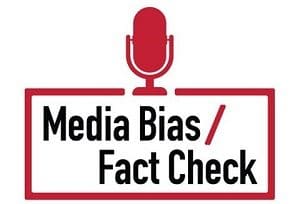LEFT-CENTER BIAS
These media sources have a slight to moderate liberal bias. They often publish factual information that utilizes loaded words (wording that attempts to influence an audience by appeals to emotion or stereotypes) to favor liberal causes. These sources are generally trustworthy for information but may require further investigation. See all Left-Center sources.
- Overall, we rate NPR (National Public Radio) Left-Center Biased based on story selection that leans slightly left and High for factual reporting due to thorough sourcing and accurate news reporting.
Detailed Report
Bias Rating: LEFT-CENTER
Factual Reporting: HIGH
Country: USA
MBFC’s Country Freedom Rating: MOSTLY FREE
Media Type: Radio Station
Traffic/Popularity: High Traffic
MBFC Credibility Rating: HIGH CREDIBILITY
History
Founded in 1970, NPR (National Public Radio) is a nonprofit organization that produces and distributes news, talk, cultural programming, music, and entertainment programs, including the premier news magazines Morning Edition and All Things Considered across broadcast and digital platforms. NPR is based in Washington, D.C.
NPR was established after President Lyndon B. Johnson signed the Public Broadcasting Act of 1967. The act created the Corporation for Public Broadcasting(CPB), the Public Broadcasting Service (PBS), and National Public Radio (NPR).
The first program broadcast on NPR was live coverage of the U.S. Senate deliberations on the Vietnam War in April 1971. NPR has also won numerous awards since its launch. Currently, Jarl Mohn is the NPR CEO, and the Ombudsman/Public Editor is Elizabeth Jensen. A list of NPR’s Board of Directors can be found here.
Read our profile on the United States government and media.
Funded by / Ownership
According to a Columbia Journalism Review article dated 2010, a large portion of NPR’s revenue comes from dues and fees paid by Member stations and corporate sponsorships. In another article by Columbia Journalism Review, they state that as of 2017, NPR receives less than 1 percent of its total funding from the Corporation for Public Broadcasting(CPB). Other revenue sources include institutional grants, individual contributions, and fees paid by the Public Radio Satellite System users. You can view all of NPR’s Financial Statements Here.
Analysis
In 2000, the conservative pro-Israel media watchdog group CAMERA accused NPR of being biased against Israel. In 2001, FAIR (Fairness and Accuracy in Reporting), a progressive media watchdog group, criticized NPR for favoring Israel. FAIR also states, “NPR is definitely skewing right.” Tim Groseclose, a professor in the Economics and Political Science Department at UCLA, and Jeff Milyo, an economics professor at the University of Missouri, report NPR has a liberal bias. According to a Pew Research survey, 67% of NPR listeners identify as left of center, with 41% being consistently liberal. Finally, According to the Washington Post, NPR CEO Jarl Mohn has contributed to Democratic candidates in statewide races, including Robert Reich’s campaign, President Bill Clinton’s secretary of labor.
Bias
In review, NPR (National Public Radio) uses moderately emotionally loaded headlines such as this: “President Trump’s Description of What’s ‘Fake’ Is Expanding.” Generally, story selection favors the Left with stories such as these: “Rise Of LGBTQ Candidates Could Usher In A ‘Rainbow Wave’ In 2018,” and Majority Of Americans Don’t Want Roe v. Wade Overturned. They also report right-leaning opinion pieces such as this: A Free-Market Economy Keeps Capitalism Ticking.
NPR reports world news with neutral headlines such as “In Bangladeshi Camps, Rohingya Refugees Try To Move Forward With Their Lives. NPR typically sources their information to credible sources such as the Washington Post, maristpoll.marist.edu, ohchr.org, The Economist, UNICEF, New York Times, etc. NPR’s news reporting is consistently low-biased, factual, and covers both sides of issues.
However, taken on a whole, NPR is favored by a liberal audience, which indicates programming and story selection tends to lean left to appeal to their core listeners. For example, A 2014 Pew Research Survey found that 67% of NPR’s audience is consistently or primarily liberal, 21% Mixed, and 12% consistently or mostly conservative. This indicates that a more liberal audience strongly prefers NPR. Further, a Reuters institute survey found that 44% of respondents trust their news coverage and 31% do not, ranking them #7 in trust of the major USA news providers.
Failed Fact Checks
Overall, we rate NPR (National Public Radio) Left-Center Biased based on story selection that leans slightly left and High for factual reporting due to thorough sourcing and accurate news reporting. (5/18/2016) Updated (M. Huitsing 06/30/2023)
Source: https://www.npr.org/
Last Updated on June 30, 2023 by Media Bias Fact Check
Do you appreciate our work? Please consider one of the following ways to sustain us.
or
Left vs. Right Bias: How we rate the bias of media sources


